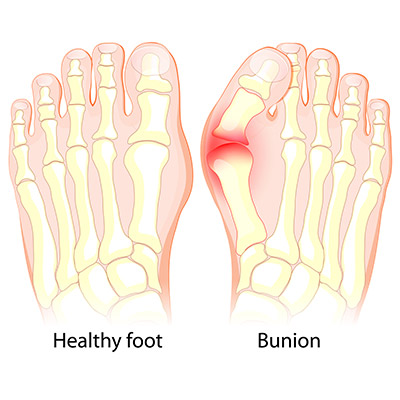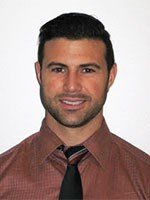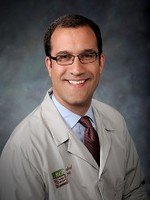Bunions, a real pain in the toe
May 18, 2018
Kathy Eber has a lot of responsibility as a full-time marketing manager at Delta-Therm, a snow and ice melt cable manufacturer in Crystal Lake. Like most people, Kathy could handle sore feet. But, when her foot soreness became legitimate pain from a protruding deformity on her big toe—otherwise known as a bunion—she knew it was time to do something about it.
According to Web MD, about 23 percent of people aged 18 to 65 and 36 percent of those older than 65 suffer with bunions. Like many issues with the feet, bunions develop when the body’s biomechanics are off.

“Everything in the body has a balance and counter balance,” points out NCH Medical Group Podiatric Surgeon Hyim Baronofsky, DPM. “Your calf muscle is the strongest muscle below the knee. When it becomes contracted, it can force the tendons that stretch into the foot to compensate for walking properly. This can result in bunions, plantar fasciitis and other issues in the feet.”
Kathy didn’t want to take a lot of time off work. Luckily, her bunion surgery was an outpatient procedure and she was able to schedule it easily at the NCH Day Surgery Center, conveniently located near her podiatrist’s Arlington Heights office. She recalls it as a fun day.
“I was in there such a short time, about three or four hours,” Kathy says. “Everybody was just so nice.”
Kathy’s surgeon Kellen Cohn, DPM says there are over 50 procedures for bunionectomy (bunion removal) and every case is scrutinized on an individual basis. He looks at factors such as biomechanical influences, level of deformity, age and activity level, bone quality, nutritional status and vascular status, medical history, lab work and more.

“It is not so simple as a ‘one size fits all’ or simply ‘shaving off the bump’,” Dr. Cohn says.
For Kathy, the minimally invasive approach paid off. She has no pain and her deformity is gone.
“In certain circumstances, patients can begin walking the same day as surgery as was the case for Kathy,” Dr. Cohn says.
In her role as a marketing manager, Kathy appreciates the value of strong messages and clear communication, both of which she received at the Day Surgery Center.
“I never had to look for somebody to know what was going on,” she remarks. “After just a few minutes in the lobby, someone took me to the surgery waiting area. The staff couldn’t have been any better. They explained what was going to happen leading up to surgery, so I knew what to expect. From the nurse who took my vital signs to the anesthesiologist, everyone was really sharp—personable, funny, helpful and quick to answer questions. My surgery went well and I was home within a few hours.”
Bunion surgeries can range from simple soft tissue procedures to complex fusions, depending on the severity of deformity and the patient’s biomechanics, points out Dr. Baronofsky. “The mild to moderate surgeries last about 45 minutes and the fusions can take as long as 75 minutes,” he adds.
Kathy says the healing process after bunion surgery is not bad. “This was a really easy recovery, comparatively,” she says. “I have had other surgeries on my foot that were more involved and took a lot longer. This procedure went very quick and I just remember everybody at NCH being great.”

In fact, Kathy’s recovery was excellent. She was walking around in regular shoes within two weeks. Dr. Baronofsky recommends that his patients expect to recover for two to four weeks. He monitors their progress biweekly for the first three months after surgery with regular X-rays to make sure the bone is healing properly.
Dr. Baronofsky credits new technology in the screws that are used in the surgeries for patients’ recovery and long-term relief.
Overall, Dr. Baronofsky recommends patients see a specialist as soon as they start to notice foot discomfort. “A lot of times we can fix the mechanics and retard the progression of the bunion, preventing it from getting worse and possibly eliminating the need for surgery.”
Dr. Baronofsky practices at three convenient locations. Make an appointment today by calling 847-725-8401, or call Health Connection at 847-618-4968 to learn about podiatrists on staff.